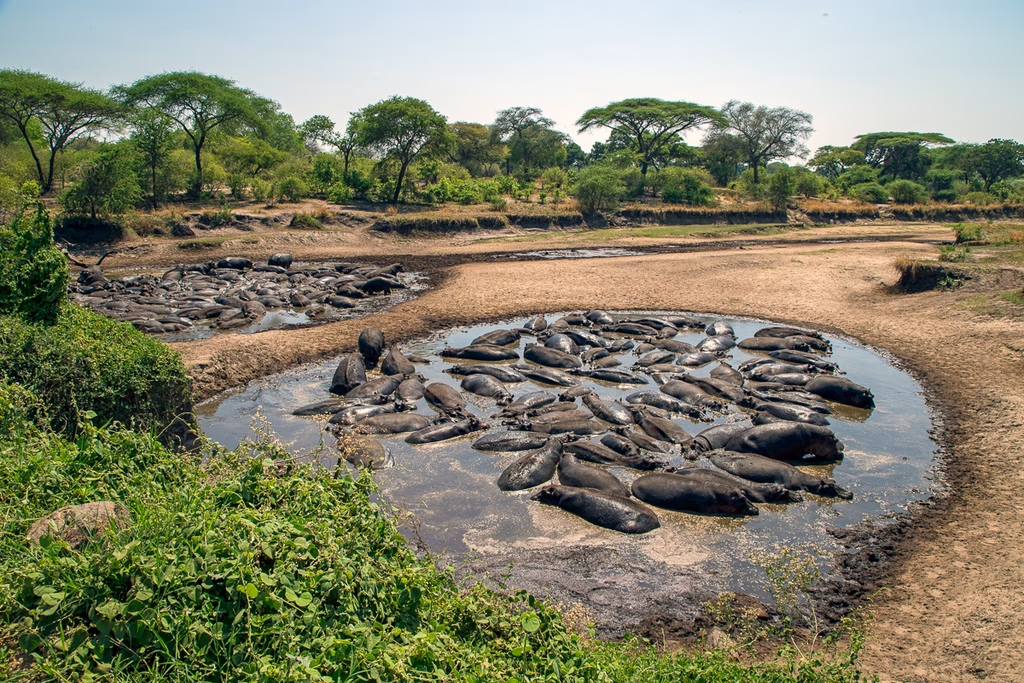Hippos in Katavi National Park: The Giants of the Water.
Katavi National Park, located in the remote southwest of Tanzania, is one of Africa’s hidden gems. It is known for its stunning landscapes, rich biodiversity, and abundant wildlife, including one of the most iconic animals found in the park: the hippopotamus. Katavi’s rivers and lakes provide a perfect habitat for these massive creatures, and the park offers some of the best opportunities for observing them in their natural environment. Here’s why hippos in Katavi National Park stand out and what makes them a must-see.

1. Katavi’s Hippos Enjoy an Ideal Habitat
Katavi National Park is home to some of the largest hippo populations in Tanzania. The park’s rivers, wetlands, and seasonal lakes provide an ideal habitat for hippos to thrive. The Kapapa River, in particular, is a favored location for large herds of hippos. Hippos spend most of their time in the water, where they cool off during the hot days and graze on the surrounding grasslands at night. The park’s lush vegetation and abundant water sources offer a steady food supply, allowing these giant herbivores to flourish in large numbers.
2. Immense Hippo Populations
Katavi is renowned for its large hippo populations. In fact, the park is home to some of the largest concentrations of hippos in Africa. During the dry season, these massive animals are often seen huddled together in waterholes, where they stay to stay hydrated and protected from the harsh sun. The sight of hundreds of hippos gathered in these areas is an awe-inspiring spectacle. It’s not uncommon to see over 500 hippos in a single water source during peak seasons, making Katavi an exceptional place for hippo-watching.
3. Hippos’ Social Structure in Katavi
Hippos in Katavi, like those in other parts of Africa, live in groups called pods. These pods are usually made up of 10 to 30 individuals, consisting of one dominant male, several females, and their young. The male hippo fiercely guards his territory, and the group’s social dynamics can be quite complex. Hippos are known to be territorial, with males defending their patches of water from rivals through aggressive displays and vocalizations. Watching these interactions, especially during the mating season, can provide visitors with fascinating insights into the behavior of these enormous creatures.
4. Hippos and Predators in Katavi
While hippos are often seen as peaceful, they are one of the most dangerous animals in Africa. Their enormous size and powerful jaws make them formidable creatures. In Katavi, hippos are occasionally preyed upon by large predators such as lions and crocodiles, although they are not the primary target for most predators. Crocodiles, in particular, pose a threat to young hippos and sometimes adults. However, the large herds and the constant vigilance of adult hippos make it difficult for predators to attack. In fact, hippos often serve as the apex herbivore in Katavi, with few natural threats.
5. Conservation Challenges and Opportunities for Hippos
Katavi National Park is relatively remote and less visited than some of Tanzania’s more well-known parks. This means the hippo populations in the park are somewhat shielded from the pressures of poaching and human encroachment, but challenges still remain. The park’s water systems are susceptible to droughts, and habitat loss due to climate change and human activity could threaten the hippo populations in the future. However, efforts are being made to conserve this vital ecosystem, and Katavi remains a sanctuary where hippos continue to thrive.
How to Access Katavi National Park
Getting to Katavi takes effort, but it’s worth it. There are two main ways:
By Air:
The most convenient way is by charter flight. Several safari companies operate flights from Arusha, Dar es Salaam, or Ruaha National Park directly to Ikuu Airstrip, which serves Katavi. These flights offer stunning aerial views and save travel time.
By Road:
For the adventurous, road travel is possible but tough. The drive from Mbeya or Kigoma takes two to three days on rough tracks. You’ll need a reliable 4×4 and a knowledgeable guide. This route isn’t for everyone, but it adds even more adventure to your trip.
Where to Stay
Katavi offers a small selection of luxury tented camps and eco-lodges. These camps sit near rivers or floodplains, giving you front-row seats to wildlife action. Most stays include guided game drives, walking safaris, and full-board service.
Best Time to Visit
Visit from June to October for the best game viewing. Water sources shrink, and wildlife gathers in large numbers. If you prefer lush greenery and birdwatching, the rainy season between November and April creates a different kind of beauty—though it may limit access due to muddy roads.
Plan Your Safari With Us
Katavi gives you Africa at its wildest. You won’t find souvenir stalls or packed viewpoints here—just raw nature and incredible wildlife encounters. With our help, you can explore this untouched part of Tanzania safely and comfortably.
Let’s plan your adventure to one of Africa’s last true wilderness areas.

